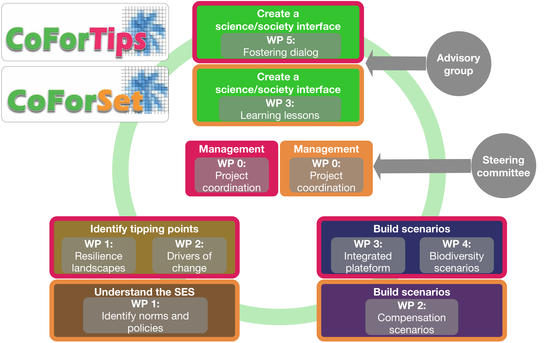Deforestation is an emerging issue in the Congo Basin. The Congo Basin forests are among the 10% of the wildest areas on Earth, they are home to an extraordinary number of plant and animal species, and with a low demographic pressure, the level of threat on biodiversity is currently weak.
However, these forests are under increasing pressure from the mining industry, agribusiness and infrastructure development. The twenty-first century may see an increase in the human population due to increased accessibility to the forest, and as a result a significant conversion of forest area.
How is biodiversity evolving? What are the human factors of environmental change? How exactly will they interact to shape the future of the region?
The CoForTips and CoForSet projects have been designed together to address these issues and they adopt the same structure: analyze what is, predict what could be, and anchor the results of this research in society.
CoForTips answers the call for proposals launched in 2011 by BiodivERsA on scenarios of biodiversity and tipping points of ecosystem and socio-ecosystems. Launched in 2013, this project combines disciplines and spatial scales. On the one hand, it develops spatially explicit models across the Congo Basin, which link social and ecological processes in order to predict how these forests' biodiversity and structure could evolve in the coming decades. On the other hand, it focuses on three study sites selected along a gradient of human intervention on forests. At each study site, the biodiversity takeholders are engaged in a participatory modeling process, to integrate individual and collective decision-making in biodiversity scenarios.
The second project, CoForSet, began in 2014 with funding from the Foundation for Research on Biodiversity (FRB). It focuses on ecological compensation mechanisms by which a developer could design, fund and implement conservation actions elsewhere to offset the environmental damage of its intervention. CoForSet mobilizes CoForTips' models and platforms, and in turn feeds back its sister project on compensation modalities and environmental impacts of these mechanisms. CoForSet uses TRIDOM, straddling Cameroon, Gabon and Congo, as study and modeling area.
Both projects explicitly address the need to integrate research in the decision making process, and therefore work closely with stakeholders and policy makers in the region.

